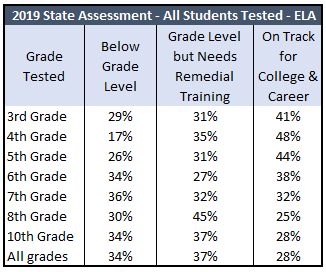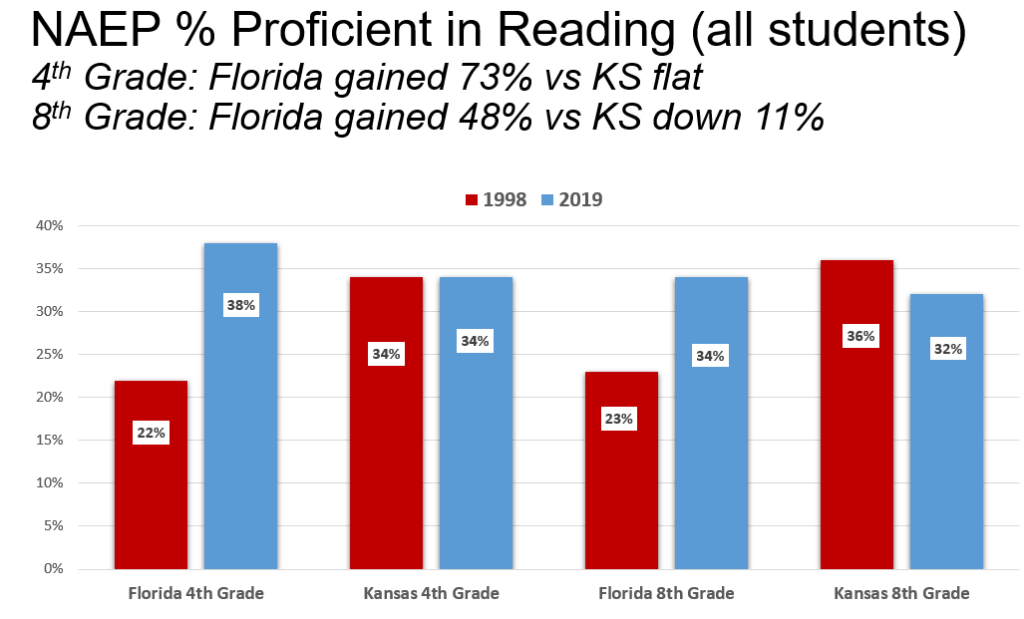Students in the 3rd and 4th grades who are struggling to read would benefit from the provisions of House Bill 2552, otherwise known as the Kansas Reading Readiness Act.
3rd-grade students scoring in Level 1 (below grade level) on the state assessment test and 4th-graders in Level 1 and Level 2 (at grade level but still needing remedial training) would be eligible for the program. Once in the program, students would remain eligible until graduating from high school.
Students have two options for participating in the Kansas Reading Readiness program. Those who choose to remain in the home district would have a fund established in their name at the State Treasurer’s office, equal to 48% of that year’s Base State Aid for Student Excellence (BASE); next year’s BASE aid is $4,439 per pupil. The money could be used to receive additional services through evidence-based practices and programs requested by the child’s parents.
Alternatively, parents could send their child to a qualified private school and have the full amount of BASE aid deposited in their child’s fund for tuition. A qualified private school is one that is accredited by the state board of education or a national or regional accrediting agency that is recognized by the state board and is approved by the State Treasure to participate in the program. The bill allows the State Treasurer to retain up to 5% of the funds deposited in the first two years to administer the program and up to 2.5% in subsequent years. The money to fund the programs would be deducted from state aid provided to each student’s home district.
The Kansas Reading Readiness Act was introduced by Rep. Kristy Williams (R-Augusta) and Rep. Renee Erickson (R-Wichita). Rep. Williams says she believes in kids and that legislators must do more to help them.
“With 10,000 third grade kids in Kansas performing below grade level in ELA annually, it’s time we wake up and make a targeted effort to bend the curve back toward success. To not do so makes us complicit with the status quo. That’s not okay. We can do better.”
 Results of the 2019 Kansas state assessment test show 29% of 3rd-graders were below grade-level and another 31% needed remedial training. 52% of 4th-graders were below grade level or needed remedial training even though they are considered to be at grade-level.
Results of the 2019 Kansas state assessment test show 29% of 3rd-graders were below grade-level and another 31% needed remedial training. 52% of 4th-graders were below grade level or needed remedial training even though they are considered to be at grade-level.
Results get progressively worse in later grades. By the 10th-grade, 72% of all Kansas students are below grade level or need remedial training.
Reading proficiency in Kansas is somewhat lower than it was in 1998 when the state first participated in the National Assessment of Educational Progress (NAEP). 4th-grade proficiency is flat, at 34%, while 8th-grade proficiency fell from 36% to 32%.
Florida, however, has seen phenomenal gains and has leaped past Kansas. 4th-graders jumped from 22% proficient to 38% proficient, while 8th-graders went from 23% to 34%.

Florida officials attribute their success to a combination of choice, transparency, and accountability – each of which is a key element of the Kansas Reading Readiness Act.
Opposition from the Kansas education lobby
Rep. Williams says Studies show that if students don’t learn to read by the third grade, their chances of success are greatly diminished. Yet while failing to show achievement progress or offering anything other than spending more money to raise student achievement, the education lobby testified in opposition to the Kansas Reading Readiness Act.
Opponent testimony was presented by the Kansas Association of School Boards, Kansas National Education Association, Kansas PTA, USD 259 Wichita, USD 501 Topeka, USD 223 Olathe, and USD 512 Shawnee Mission, and the United School Administrators of Kansas among others. They generally opposed making public funding available for private schools.
Kansas Policy Institute, the Sentinel’s parent company, produced a documentary on Florida’s transformational improvement; former Governor Jeb Bush said the education lobby’s opposition is really about the economic interests of the adults in the education system.
Williams says continually promotion kids to the next grade while knowing they aren’t prepared is harmful to students and communities.
“I want students to have success and have all the benefits of that success. I believe that each child is inherently capable of much more than he or she is currently asked to give. If we lower our expectations, or just maintain social promotion, we actually do the reverse of what we hope to accomplish — we hurt kids and their ability to succeed.”



